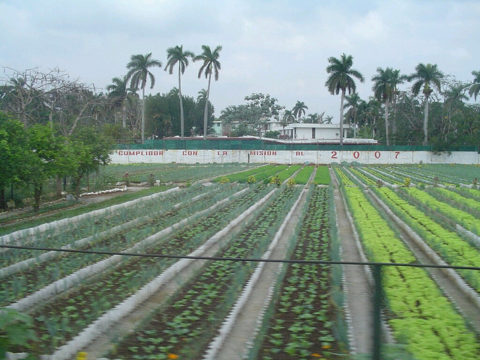
Faced with a choice between growing food and playing soccer on this field, Cubans showed us what we all are going to have to do pretty soon.
Last month, EcoWatch ran an article on urban farming in Cuba, holding the practice up as a way to feed cities and countries that find themselves in deep crisis, as Cuba did in the 1990s after the Soviet Union collapsed. Deprived overnight of its primary source of food and energy imports, and its primary customer for its sugar cane exports, the country faced starvation. The people began to grow food without benefit of fuel, chemical sprays and fertilizer, because they didn’t have any fuel, chemicals or fertilizer. They began to grow food in backyards and on sports fields because they had no way to transport food to distant markets. And they made it work.
I’m bringing this to your attention now for two reasons. Okay, three. One, it’s interesting. Two, it gives me a chance to point out that I wrote about this five years ago, in an article titled “The World’s Most Sustainable Country: What? Cuba?” And three, it gives me a chance to ask for your help in solving a mystery that is driving me nuts.
For the decade or so that I have been writing The Daily Impact, “The World’s Most Sustainable Country: What? Cuba?” is far and away the number one post in accumulated page views. And every day, to this day, five or six people read it.
Now, if some large website posts a link to me and directs a ton of traffic my way, I know who did it and when. If a particular search term becomes frequent and leads to my pages, I know it. None of this applies here, and here’s my question: WHO ARE YOU PEOPLE???
Comments are necessarily closed after 30 days because otherwise spammers clog old articles with links to their make-a-fortune-working-at-home and cheap-viagra websites. So I’m putting an update link to this article on the old one in the hope that someone will tell me what’s been going on for the past five years.
So if you got here by way of the old article, please leave a comment telling me how you became aware of it, and what your interest is. Please. I need to be able to sleep at night again.
Typo : as Cuba did in the a990s.
Thanx
Tom – I have your page as a bookmark and look for new stuff every day. Am impressed with your ability to ‘see’ the future. Keep writing.. Russ
Thank you, sir. Much appreciated.
I have similar curiosity regarding a single old post at my blog that garners the lion’s share of traffic via Pinterest. How much is valid vs. bots I can’t judge. I don’t close comments, but no one comments (besides the bots that are filtered to spam), so it remains a mystery, chalked up as one of the vagaries of hyperconnectivity driven by new media and communications technologies.
A hopeful sign. A number of people scattered around are aware and looking for solutions, says to mitigate the coming shortages.
I read the 2015 article – very informative.
It looks to me like, in the long run, Cuba benefited nicely from the loss of its two parasitic empire overlords – the US and the USSR.
Consider the words of the prophet:
“I thought I’d say somethin’ to strike him kinda’ weird, so I said, ‘I like Fidel Castro and his beard'”. – Bob Dylan
What percentage of Americans believe the US should be more like Cuba in any way? <1%. Yet US farmers should look to the island nation. Sure, that'll happen.
“WHO ARE YOU PEOPLE??”
It wasn’t me. I think I remember reading it but I didn’t tell anyone about it. Still, its gotta be my fellow socialists, spreading the word one brother to another and so on down the line. Though even now we are allowed only to lurk in the shadows, are numbers at present are less than pathetic.
However, I did tell everyone I know, and like, and who doesn’t have literacy issues, to read The Days After Tomorrow series. If they had followed proper exponential procedure, each of those posts would be in the millions by now, maybe even in the billions*
*Like climate scientists, I really have no clue how fast the exponential function is.
Not very fast, apparently, but thanks for trying….